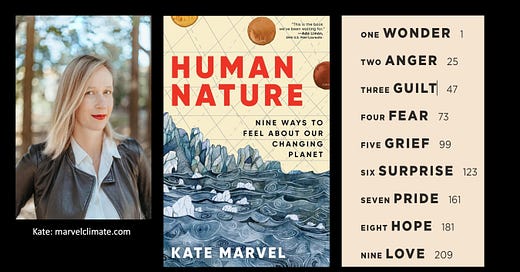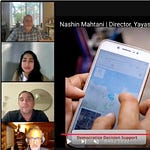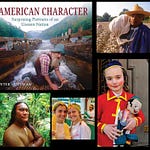Here’s my Sustain What conversation with Kate Marvel, a prominent climate scientist and communicator whose first book, Human Nature - Nine Ways to Feel About Our Changing Planet, is a bracing and deeply personal tour of climate science, planetary history and the array of hopeful and/or heartbreaking environmental futures ahead, depending on choices made or avoided now.
Thank you,
and , for being among subscribers who watched live on Substack. Please subscribe to catch future episodes and share this post.Marvel and I explored the book’s nine chapters, and feelings. You can see three highlights below but please do watch and share the conversation here or on n Facebook, LinkedIn, or YouTube.
I love how she emphasizes the importance for scientists (and I’d argue for all of us) to recognize your emotional reactions to grand challenges like human-driven climate change as well as the facts and enduring questions:
I think we should be as honest about observing and documenting our emotions as we are about measuring rainfall or soil moisture. Pretending we feel nothing about our changing world doesn’t make us objective. It makes us liars.
Here are three highlights:
What really scares Marvel isn’t the physics:
So there's all this stuff that physics gives us to be afraid of, right? These big monsters that are coming for us in the future.
But the thing that scares me the most is that climate change happens in the world that we've built for it. And it happens in this sort of deeply unequal world that is not governed in an optimal way.
And so there's this notion that, oh, we'll just adapt. And there's no just about adaptation.
But the notion that all decisions will be made in an equitable manner by looking soberly at the best available science, I just don't think that that is supported by either current events or the historical record.
And so, you know, the thing that I am the most frightened about when it comes to climate change is what it's going to make us do to each other.
I couldn’t agree more. I wrote about “the scariest science” and the climate justice gap awhile back:
Here’s Marvel on avoiding misconceptions about public attitudes on climate change:
The vast majority of people are either totally freaked out or at least concerned. Another aspect of the polling is that most people wildly underestimate how much other people care about climate change.
So most people say, I am very, very worried, but nobody else is. And then if you start talking about it, you realize that, oh, everybody feels the same way as me. And the hardcore deniers, that's like a tiny single digit fraction of the population.
Marvel says use your own reactions to being badgered to gauge how to talk to others about climate or other fraught issues:
I haven't studied climate communication, but I know what doesn't work on me personally. I don't like being scolded. I don't like being shamed. And I don't like being told that there's nothing I can do.
And just for me personally, I tend to shut down.
But if I'm if I'm engaged with, like, did you know that the water on Earth is older than the sun? You know, that's a great in to people because everybody is amazed by some aspect of the planet that we live on.
And if you talk about, hey, did you know that there's a way to keep your house hot and cold that is way cheaper and better than burning fuel oil? You know, maybe that's an entry as well….
I think there can be a tendency, and I feel it in myself, to demand that people have the right views on absolutely everything. And that's never going to happen. That's not how people work.
I hope you’ll buy and read the book and please do share this post widely.
And I hope, if you can afford it, that you might consider financially supporting my Sustain What effort.
Here’s
’s post with lots more on Marvel and the book (I’m way overdue to have Johnson on Sustain What to talk about her books and work fostering the capacity for action on climate change, ocean restoration and other key challenges.
















Share this post